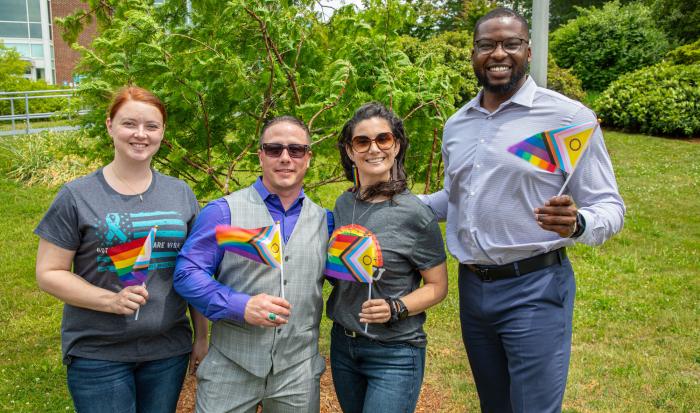
QCC celebrated National Pride Month during June with several events and workshops to spread awareness and connect people with resources for the LGBTQ+ community.
Remembering LGBTQIA+ Rights, "Don't Ask, Don't Tell" Policy and PTSD Awareness
On June 14, the Veteran Affairs Office, the Counseling and Wellness Office and the Diversity Equity and Inclusion Office held this event to provide valuable resources and educational materials related to LGBTQIA+ rights, the historical significance of the "Don't Ask, Don't Tell" policy, and PTSD awareness.
They also distributed small Pride flags and stickers, allowing folks to show support and pride during Pride Month. These symbols of unity and acceptance can be displayed in personal spaces or worn to demonstrate a commitment to equality.
Trans 101
On June 26, Heart, a trans masc activist, educator and public speaker, provided an engaging training session on how to be inclusive of the trans and gender nonconforming community.
To begin, it was stated that transphobia has increased in the U.S. and has negative effects on all of us. Being trans is not new and it is not a mental health affliction. The Human Rights Campaign estimates that there are over 2 million trans people in the U.S. and Track Trans Legislation reports that over 400 anti-trans bills have been introduced this year across the country.
For some of the language basics, Heart explored useful terminology including:
- Trans: doesn't identify with what was assigned at birth. Trans is also an umbrella term that may include those who identify as gender fluid, two-spirit, trans masc, trans femme, non-binary, and more. But not all of those who are non-binary may identify as trans. A more inclusive term might be gender non-conforming.
- Cis: identifies with what they were assigned at birth.
- Sex: biological and related to genitals, organs and chromosomes.
- Gender: a social and cultural construct that is self-determined.
- Gender identity vs. sexual orientation: While there is a relationship between the two, they are not the same thing. Trans does not mean you identify as queer, gay or homosexual. Many trans people are straight or heterosexual.
- Gender identity vs gender expression: The signs of gender expressed outwardly such as hair, clothes, etc. doesn't directly tell us a person's gender identity.
- Pronoun: a word used to describe a person when not using their name.
- Neopronouns: new pronouns such as ze/zir or xe/xem. There are countless pronouns and they change frequently.
Heart suggested many ways QCC can be more inclusive by updating gender data on forms and lists, assessing the amount of and access to gender-neutral bathrooms and looking at workplace-sponsored healthcare policies for gender-affirming care, and securing accommodations for students experiencing gender dysphoria.
He also gave suggestions for what to do if you or another person misgender someone. One suggestion was simply to correct yourself and move on. He also noted that sharing your own pronouns first can make people feel more comfortable sharing their own.
"I know these topics might be overwhelming or confusing so give yourself grace," said Heart. "It's not simple and I want to be real and honest with you otherwise I wouldn't be giving you the truth about the trans experience. And hopefully this will help you open up your heart and see your own experiences and maybe they're not as clear and easy to understand as they once were. We're doing a lot of learning and unlearning, myself included."
Heart also stressed the fact that becoming more inclusive, and addressing policies and procedures can be lifesaving.
"One in 5 trans and nonbinary youth in the US attempt suicide and the number is even higher for black trans and nonbinary youth. So these are lifesaving measures," Heart said. "Validating them by not even going out of your way, but using the right pronouns or names, will ensure they continue to show up for class."
For more information or access to the recording of this event contact DEI Executive Director Kevin Lovaincy at klovaincy@qcc.mass.edu.
The Changing Nature of Gender in the 21st Century
On June 28, Dr. Genny Beemyn, a trans educator, author, speaker, consultant and director of the UMass Amherst Stonewall Center since 2006, as well as the coordinator of Campus Pride’s Trans Policy Clearinghouse since 2012, spoke at QCC about changes in the concept of gender.
Beemyn shared data from the American College Health Association National College Health Assessment survey including a statistic from 2022 that approximately 6% of college students are out as trans or nonbinary and this number has been increasing year after year. They noted that it is still most likely an underestimate because many students might be afraid to express their identity or have never been asked.
The presentation also included data from the Common App, which is used by more than 1,000 colleges, which found 2.7% of applicants identified as trans or nonbinary. It was noted that this might be due to the fact that applicants often fill out the form with parents or school officials and they might not be out to them yet.
The Common App also recorded over 100 unique responses to gender identity, which Beemyn saw as a positive sign that there is more representation and more language to identify with.
There is also a growing list of pronoun combinations used by trans and nonbinary young people, with "they/them" being the most common.
"This is important because having a name for yourself brings you into existence," Beemyn continued.
Some of the single-gender write-ins from the Common App included female adjacent, gender apathetic, multigender, pangender and xenogender. Overall students wrote in over 100 unique gender identities.
Beemyn also suggested many ways that a higher education institution can be inclusive of trans and nonbinary students. Some measures included implementing consequences for repeated misgendering, staffing an LGTBQIA+ office, supplying gender-inclusive bathrooms and including pronouns and chosen names on rosters, administrative systems and syllabi.
For more information or access to the recording of this event contact Kevin Lovaincy at klovaincy@qcc.mass.edu.
